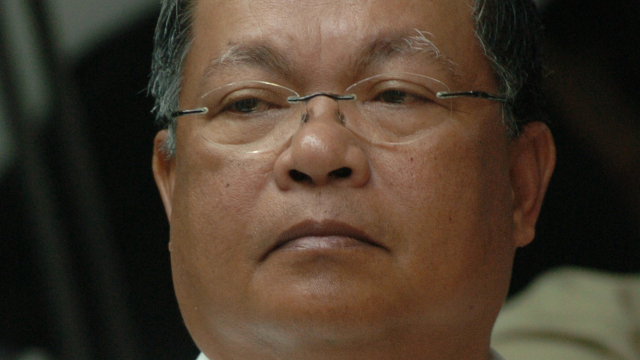Editorial from Ang Bayan posted to the CPP Website (Apr 22):
Drive out the fascists from Talaingod!

CPP Ang Bayan
For almost two months now, the AFP has been mounting intense military operations and going on a fascist rampage in a cluster of sub-villages in Barangay Palma Gil, Talaingod, Davao del Norte. Since the first week of March, battalions of troops from the Armed Forces of the Philippines have been sowing terror in this area. The 68th and 60th IB and the 4th Special Forces have been concentrating on eight sub-villages in Palma Gil, spurring more than 1,300 Ata-Manobo tribespeople to flee. They are currently seeking refuge with church people and other concerned groups in Davao City.
The Ata-Manobo decided to evacuate because staying in their communities would have meant suffering hunger and repression amid the rampant militarization. For weeks, they have been prevented by soldiers from going to their farms, saying these were owned by the New People’s Army (NPA). Their schools have also been branded as “NPA schools.” The soldiers have turned the schools into barracks and destroyed a number of farms. Many Lumad leaders and tribespeople have been harassed and subjected to interrogation, including children, women and the elderly. Some have been forcibly used as guides in military operations. On March 20, the area was bombarded by AFP airplanes and two helicopters for more than an hour.
The Ata-Manobo have taken a stand. They have decided not to allow the soldiers to suppress them, occupy their communities, destroy the farms they had worked hard to build and violate their schools. They clandestinely but organizedly fled their sub-villages to go to the plains to expose to the public how the AFP has been wantonly abusing their rights. They declared that they would not return for as long as their safety could not be guaranteed from the marauding fascist military. And this could only happen if the AFP pulls out of their communities.
In cahoots with the military, the mayor of Talaingod tried to bribe the evacuees by offering them relief goods if they would return to a “safer area” in Palma Gil. But the Lumad firmly refused this attempt to herd them into a hamlet and allow military operations in their sub-villages. They had only one demand: the pullout of the fascist soldiers and a stop to the massive militarization of their communities.
The Lumad also bared the real reason behind the current military operation—to pave the way for the entry of large-scale mining into the heart of the Ata-Manobo’s ancestral land. The mining companies’ target is Pantaron Range, one of the few remaining dense forestlands along the Davao del Norte-Bukidnon-Davao City and Agusan provinces boundary.
The sub-villages being scoured by the soldiers lie at the gateway to these resource-rich forests. Since 2008, several mining companies had already filed applications to explore the area. But their attempts have all been thwarted because of the Ata-Manobo’s heroic struggle and the fierce opposition of their allies.
Meanwhile, the people strengthened their unity in order to overcome their neglect by the reactionary government. Three calamities had hit them—a massive rat infestation that destroyed their crops, and disasters resulting from typhoons Pablo and Crising. Just as other hinterland villages had experienced, not a single drop of aid came from the local and national government of the reactionary state. They thus took the initiative to develop production, build their own schools and launch health and other campaigns, with the help of progressive organizations and institutions.
Fascist military troops are now mounting vicious attacks on the area because for the reactionaries, it is a terrible nightmare for genuine people’s power to emerge and for the minority peoples to benefit from the fruit of the land. The eradication of hunger and ignorance among the the Lumad masses likewise brings grim forebodings to the reactionaries. For the reactionaries, the minority masses must remain in a state of wretchedness and disunity so they could easily be bribed by money, terrorized and suppressed and deprived of the natural resources found in their ancestral lands.
The intense militarization of Talaingod and the Ata-Manobo’s fierce resistance bring to the fore the sharp contradictions between two opposing forces. On one end is the fascist AFP, that serves as the instrument of the reactionary state and its imperialist, big bourgeois comprador and big landlord cohorts in suppressing the people. On the other are the Ata-Manobo and other oppressed and exploited people who are waging fierce resistance and desirous of thoroughgoing social change.
The Communist Party of the Philippines urgently calls on all the people to declare their loathing for, and oppose, the fascist violence being unleashed by the reactionary Aquino regime in Talaingod, whose only objective is to suppress the Ata-Manobo and cede their ancestral land to plundering mining and logging companies.
The AFP’s fascist onslaught in Talaingod mirrors the fascist rampage in other resource-rich areas being coveted by the reactionaries. This fact must be tirelessly exposed and resisted.
In the face of the fascist attacks in Talaingod and many other areas, it is very timely to forward the burning issues of destructive foreign mining, the displacement of the minority and peasant masses and the destruction of their livelihoods. These are the issues that lie at the core of the Comprehensive Agreement on Social and Economic Reforms (CASER), the second substantive agenda in the peace negotiations. Also among the issues under CASER are the pathetic state of health care, the widespread demolitions amid the lack of programs for decent housing and other crucial social concerns. The Aquino regime has been thwarting talks on the CASER because these would only shed a garish light on the reactionary state’s criminal negligence of the people’s social welfare. Only the strength of a unified people who love justice and peace can push the regime to resume negotiations.
The Party and all the revolutionary forces and masses hail the Ata-Manobo’s courage and firmness of principle as they resist militarization and determinedly drive out the fascist AFP from their ancestral land. They likewise salute all other people waging intense struggle against militarization in their communities. In consonance with their struggle, the New People’s Army will go all-out in implementing the revolutionary policy of thwarting and expelling all those who plunderer the nation’s natural resources, destroy the environment, seize lands and trample on the rights of the oppressed and exploited masses.
History of resistance in Talaingod
The Ata-Manobo have been waging resistance against those who have been seizing and destroying their ancestral land for the past 20 years.
In November 1993, twenty-five of the tribe’s datus gathered to declare a pangayaw or tribal war against logging giant C. Alcantara and Sons Inc. or CASI (formerly Alsons). CASI has a 20-hectare logging concession encompassing a huge portion of the Ata-Manobo’s ancestral land in Davao del Norte. It acquired the concession on the strength of an Integrated Forest Management Agreement (IFMA) after its old timber license for the same area expired. The datus wanted to put a stop decisively to the denudation of their forest.
They formed the Salugpungan ‘Ta Igkanugon (Unity for the Defense of Ancestral Land) led by Datu Guibang Apoga and held dialogues with CASI and its puppet local government to set boundaries on the IFMA’s coverage. CASI refused. It was after this that military attacks on anti-IFMA areas began.
In February 1994, three truckloads of soldiers from the 64th IB swooped down on Talaingod ostensibly to rid the area of the New People’s Army. They burned down houses, stole crops and slaughtered the farm animals of Ata-Manobo who were opposed to the IFMA. The brutal military operations led more than 500 Lumad to flee towards the towns centers of Davao del Norte and seek sanctuary in the churches. Meanwhile, Datu Guibang stayed in the mountains to defend the land.
Davao City Mayor Rodrigo Duterte brokered the forging of a Memorandum of Agreement between Salugpungan and CASI calling for limits to the IFMA’s coverage and the pullout of the military troops. After this, the evacuees returned to their respective communities.
After a month, however, CASI lumbered in with equipment and military escorts to operate in areas beyond the agreed boundaries. Datu Guibang and his group decided to launch the pangayaw.
Bringing with them their indigenous weapons, they warned CASI’s guards. But the latter merely laughed at them. After their third warning was ignored, the Ata-Manobo attacked, killing and wounding a number of the guards.
Arrest warrants were issued for the 25 Salugpungan datus. Datu Guibang retreated and went into hiding in the forests, but the Ata-Manobo still look up to him as their leader in their struggle against those who want to seize their ancestral land. Meanwhile, armed Ata-Manobo have been launching sporadic attacks against the military that has been protecting CASI.
The Ata-Manobo’s courage in confronting the massive militarization being launched to facilitate the entry of mining companies into their ancestral land is a continuation of their heroic history of resistance.



